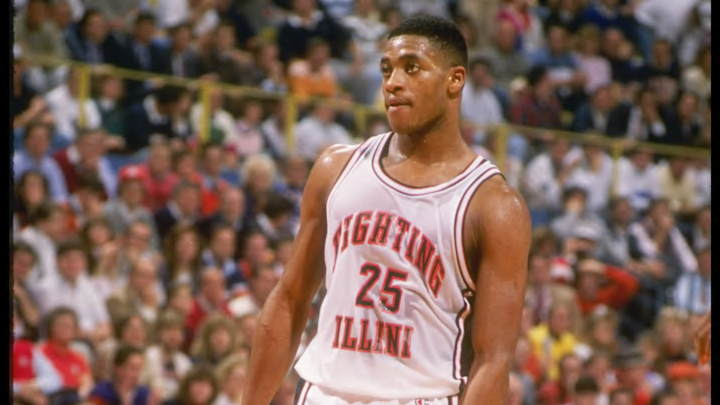8. Kendall Gill (1986-90)
I would loved to have seen what Kendall Gill could have done on the court in the college game today. The guy was a monster for the Illini.
Not only did Gill do big things on the basketball court, but I think he would have cashed in on his great Illinois career.
Gill was a consensus All-American for the Orange and Blue. This would have earned him a lot of money. The fact he can be one of the best players in the nation is huge.
Illinois also saw a ton of success with Gill on the court. He was a huge part of the Flyin’ Illini team that went to the Final 4. Gill also came back for one more season and was Illinois’ leading scorer, averaging 20.0 points per game.
The only downside to Gill’s financials would have been the first few years. He wasn’t the leading scorer on those great Illinois teams, and we had a lot of talent. The more talent the more wealth that has to be spread.
With that being said, I think Gill still cashed in big time. The fact he came back for another season would have earned him even more money.
7. Eddie Johnson (1977-81)
There haven’t been too many Illinois basketball players who could shoot the ball the way Eddie Johnson was able to knock down shots. He was one of the legends of the Orange and Blue.
As one of the OG’s of the Illini resurgence, I think Johnson cashes in during his time in Champaign. Before Johnson got to Illinois, we hadn’t made the NCAA tournament in 15 seasons.
Johnson was also a Parade All-American coming out of high school. His ability would have earned him a huge paycheck in the college ranks.
Illinois started winning when Johnson arrived. He was the leading scorer on multiple solid Illinois squads, and he averaged 17.2 points, 9.2 rebounds, and 2.4 assists per game on an Illini team that made it to the NCAA tournament in 1981. We got to the Sweet 16 that season.
There really isn’t a downfall with any of the top seven on this list. The only reason Johnson isn’t higher is that Illinois felt more like a football school in the late 1970s and early 1980s. The money might not have been flowing in quite as much as it would have been in the late 1980s and on.
